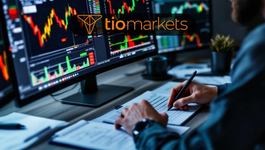Factors Influencing the US Dollar Value | TIOmarkets
BY TIOmarkets
|June 13, 2024Understanding the dynamics of the US Dollar value is crucial for traders and investors alike. The US Dollar, being the world's primary reserve currency, plays a pivotal role in the global financial markets. This article delves into the various factors that influence its value, offering insights into how these elements interplay to affect the currency's strength and stability.
Economic Indicators
Economic indicators are vital tools for gauging the health of the US economy and, by extension, the value of the US Dollar. These indicators provide a snapshot of economic performance and trends, influencing investor sentiment and currency valuation.
Gross Domestic Product (GDP)
The Gross Domestic Product (GDP) measures the total economic output of a country. A rising GDP indicates a growing economy, which typically bolsters investor confidence in the US Dollar. Conversely, a declining GDP can signal economic troubles, leading to a depreciation of the currency.
Quarterly GDP reports are closely monitored by traders and investors as they provide a comprehensive overview of economic activity and growth prospects.
Unemployment Rate
The unemployment rate is another critical economic indicator. Lower unemployment rates are often associated with a strong economy, as more people in employment can lead to increased consumer spending and economic growth. This, in turn, can strengthen the US Dollar.
High unemployment rates, however, may indicate economic distress, potentially weakening the currency as consumer spending and investment decline.
Inflation Rate
Inflation measures the rate at which the general level of prices for goods and services is rising. Moderate inflation is typically a sign of a healthy economy, but high inflation can erode purchasing power and undermine the value of the US Dollar.
The Federal Reserve closely monitors inflation rates to adjust monetary policy accordingly, which in turn affects the currency's value.
Monetary Policy
The Federal Reserve's monetary policy is a key driver of the US Dollar's value. Through its control of interest rates and money supply, the Fed influences economic activity and inflation, impacting the currency's strength.
Interest Rates
Interest rates set by the Federal Reserve directly affect the US Dollar. Higher interest rates offer lenders in an economy a higher return relative to other countries. Therefore, higher rates attract foreign capital to US assets, increasing demand for and the value of the US Dollar.
Conversely, when the Fed lowers interest rates, it can reduce the appeal of US assets, leading to a depreciation of the US Dollar.
Quantitative Easing
Quantitative easing (QE) is a monetary policy tool used by central banks to stimulate the economy by increasing the money supply. While QE can help bolster economic growth, it can also lead to a devaluation of the US Dollar, as an increase in money supply can reduce its purchasing power.
The implementation of QE is closely watched by market participants for its potential impact on currency value.
Global Market Dynamics
Global market dynamics, including geopolitical events, trade relations, and market sentiment, also significantly influence the US Dollar's value.
Geopolitical Events
Geopolitical tensions and uncertainties can lead to volatility in the currency markets. In times of global instability, investors often flock to the safety of the US Dollar, considering it a safe-haven asset. This can increase its value relative to other currencies.
Conversely, easing of tensions can lead to a decrease in demand for the US Dollar as investors seek higher returns elsewhere.
Trade Balances
The US trade balance, the difference between exports and imports, affects the demand for the US Dollar. A trade surplus can increase demand for the US Dollar, as foreign buyers need the currency to pay for US goods and services. A trade deficit, however, can lead to a depreciation of the US Dollar, as it indicates a greater demand for foreign currencies.
Trade agreements and policies can also impact the trade balance and, consequently, the value of the US Dollar.
Market Sentiment
Market sentiment, driven by investor perceptions and expectations, plays a crucial role in the valuation of the US Dollar. Positive sentiment towards the US economy and its prospects can bolster the US Dollar's value, while negative sentiment can lead to depreciation.
Investor sentiment is influenced by a myriad of factors, including economic data, geopolitical events, and monetary policy decisions.
In conclusion, the value of the US Dollar is influenced by a complex interplay of economic indicators, monetary policy, and global market dynamics. Traders and investors must stay informed about these factors to navigate the currency markets effectively. While the opportunities for profit are significant, it's important to approach currency trading with a well-considered strategy and an awareness of the risks involved.
Impact of Technological Advancements
Technological advancements have also started to play a significant role in influencing the value of the US Dollar. With the rise of digital currencies and blockchain technology, there is a growing debate about the future of traditional fiat currencies like the US Dollar.
Some experts argue that the increased adoption of digital currencies could potentially challenge the dominance of the US Dollar as the global reserve currency. The efficiency and transparency offered by blockchain technology have the potential to reshape the financial landscape, impacting the value and perception of traditional currencies.
As technology continues to evolve, it will be essential for policymakers and market participants to adapt to these changes and consider how they may affect the value and stability of the US Dollar in the long run.
Blockchain and Cryptocurrency
Blockchain technology, the underlying technology behind cryptocurrencies, has the potential to revolutionize the way financial transactions are conducted. Its decentralized nature and secure protocols offer a level of transparency and efficiency that traditional financial systems may struggle to match.
The emergence of cryptocurrencies as alternative forms of payment and investment has raised questions about the future role of fiat currencies like the US Dollar. While some see cryptocurrencies as a threat to traditional currencies, others view them as complementary assets that could coexist with fiat currencies in the future.
Regulatory developments and market acceptance of cryptocurrencies will continue to shape their impact on the value and perception of the US Dollar in the global economy.
Social and Environmental Factors
Increasingly, social and environmental factors are being recognized as influential drivers of economic and currency value. Issues such as climate change, social inequality, and corporate responsibility are becoming significant considerations for investors and policymakers.
Investors are increasingly looking at companies' environmental, social, and governance (ESG) practices when making investment decisions. Companies that demonstrate strong ESG performance are seen as more sustainable and resilient, which can attract investment and contribute to economic stability.
As awareness of social and environmental issues grows, their impact on economic policies and market dynamics, including the value of the US Dollar, is likely to become more pronounced. Adapting to these changing dynamics will be essential for maintaining a stable and prosperous global financial system.
ESG Investing
ESG investing, which integrates environmental, social, and governance factors into investment decisions, has gained traction in recent years. Investors are increasingly seeking opportunities that align with their values and contribute to positive social and environmental outcomes.
Companies that prioritize ESG considerations are viewed more favorably by investors, as they are perceived to be better positioned to navigate long-term challenges and capitalize on opportunities in a rapidly changing world. This shift towards sustainable investing is reshaping the investment landscape and influencing the valuation of currencies like the US Dollar.
As ESG criteria become more mainstream in investment practices, their impact on economic policies and market dynamics, including currency valuation, will continue to grow in significance.
By considering the multifaceted influences on the US Dollar's value, from economic indicators and monetary policy to technological advancements and social factors, traders and investors can gain a more comprehensive understanding of the currency markets. Adapting to evolving trends and staying informed about the interconnected factors shaping currency valuation is essential for navigating the complexities of the global financial landscape.
Start Trading with TIOmarkets
Now that you're equipped with knowledge about the factors influencing the US Dollar value, it's time to put that understanding into action. Join over 170,000 traders in more than 170 countries who have chosen TIOmarkets as their trusted forex broker. With our platform, you can trade over 300 instruments across 5 markets, including Forex, indices, stocks, commodities, and futures, all with low fees. Enhance your trading skills with our comprehensive educational resources and step-by-step guides. Ready to dive into the world of trading? Create a Trading Account today and start your journey with TIOmarkets.

Risk disclaimer: CFDs are complex instruments and come with a high risk of losing money rapidly due to leverage. You should consider whether you understand how CFDs work and whether you can afford to take the high risk of losing your money. Never deposit more than you are prepared to lose. Professional client’s losses can exceed their deposit. Please see our risk warning policy and seek independent professional advice if you do not fully understand. This information is not directed or intended for distribution to or use by residents of certain countries/jurisdictions including, but not limited to, USA & OFAC. The Company holds the right to alter the aforementioned list of countries at its own discretion.
Join us on social media

Behind every blog post lies the combined experience of the people working at TIOmarkets. We are a team of dedicated industry professionals and financial markets enthusiasts committed to providing you with trading education and financial markets commentary. Our goal is to help empower you with the knowledge you need to trade in the markets effectively.
Related Posts





